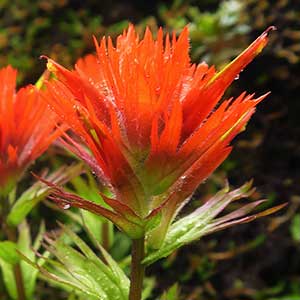Castilleja chambersii
Castilleja latifolia
Chambers' Indian paintbrush, Chambers' paintbrush
Monterey coast paintbrush, Monterey Indian paintbrush, Monterey paintbrush, seaside paintbrush
solitary or few to several, ascending, sometimes short-decumbent and rooting, branched from near base, sometimes distally, glabrous or glabrate with hairs very sparse, ± appressed, very short, soft, eglandular.
many, spreading to erect, much-branched, with numerous short, leafy axillary shoots, hairs moderately dense, spreading, medium length to long, stiff to soft, shorter stipitate-glandular ones.
green, often brown- or purple-tinged, oblong to lanceolate to narrowly ovate or ovate, (1–)2–5.8 cm, not fleshy, margins plane, ± involute, deeply 3–7(–11)-lobed, sometimes with secondary lobes, apex narrowly acute;
lobes erect to ascending, lanceolate to linear-lanceolate to oblanceolate, apex acute.
gray-green becoming ± purple to sometimes green as hairs are lost, oblong to lanceolate-oblong or broadly lanceolate, 0.5–2 cm, ± fleshy, cupulate, sometimes obscurely so on distal portion of stem, margins plane, sometimes ± wavy, involute, 0–3-lobed, apex truncate or broadly rounded to obtuse;
lobes erect to ascending, oblong, apex rounded.
3–15 × 2–4.5 cm;
bracts proximally greenish, distally bright red, scarlet, or pale reddish orange, rarely orange-yellow, often fading to pale yellowish orange with age, obovate to orbicular, fan-shaped, (3–)5–9(–13)-lobed, sometimes with secondary lobes;
lobes erect or ascending, lanceolate to triangular, short and medium length, usually arising at or above mid length, rarely below, apex acute.
2.5–20 × 1.5–5 cm;
bracts proximally green to dull, deep brownish purple, distally bright red, red-orange, or orange, sometimes yellow to yellow-orange, oblong or broadly lanceolate to widely obovate or ovate, often cup-shaped, center lobe often expanded distally, 0–3(–5)-lobed, often wavy-margined;
lobes ascending, oblong, short or long, arising near or above mid length, central lobe apex mostly rounded to truncate, sometimes with 5 or so very shallow teeth.
straight, 30–45 mm;
tube 14–19 mm;
beak long-exserted, adaxially green or yellow-green to brownish, 18–24 mm;
abaxial lip deep green, reduced, 1–3 mm, 10% as long as beak;
teeth incurved, greenish to dull purplish, 0.5–1.5 mm.
slightly curved, 19–30 mm;
tube 8.5–15 mm;
beak exserted, adaxially green, 8.5–15 mm;
abaxial lip ascending, deep green, reduced, 0.5–1 mm, 5–10% as long as beak;
teeth incurved, reduced, green or white, 0.2–0.5 mm.
proximally green, sometimes purple to brown, distally colored as bracts, 20–30 mm;
abaxial and adaxial clefts 7–14 mm, ca. 33% of calyx length, deeper than laterals, lateral 2–4 mm, 10–15% of calyx length;
lobes triangular, barely longer than wide, apex acute or acuminate to obtuse.
proximally light green to sometimes purple, distally colored as bracts, 15–25 mm;
abaxial and adaxial clefts 6–9.5 mm, 33–50% of calyx length, deeper than laterals, lateral 1–3 mm, ca. 12% of calyx length;
lobes broadly triangular to oblong, apex rounded to obtuse, rarely acute.
= 24.
= 24.
Castilleja chambersii
Castilleja latifolia
Castilleja chambersii is limited to the summits of three volcanic peaks in the northern Coast Range of Clatsop County, Oregon, and at one similar area in nearby Pacific County, Washington. It is similar to C. rupicola, and the two likely share a common ancestor. Disturbance and erosion from logging and road construction represent significant threats to C. chambersii. Populations of C. chambersii often grow near and even alongside C. hispida, but hybrids are rare.
(Discussion copyrighted by Flora of North America; reprinted with permission.)
Castilleja latifolia is endemic to the central California coast, especially around Monterey Bay. Around Half Moon Bay in San Mateo County, it apparently forms hybrids with C. affinis var. affinis. Records of this species from north of San Francisco and south of Monterey County are referable to other species.
(Discussion copyrighted by Flora of North America; reprinted with permission.)


